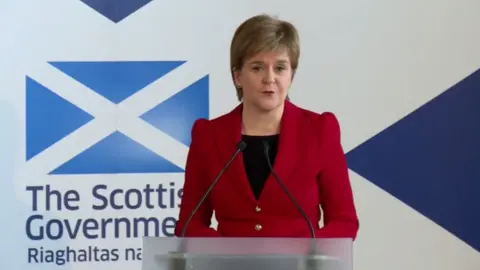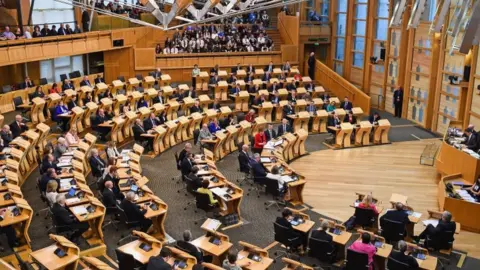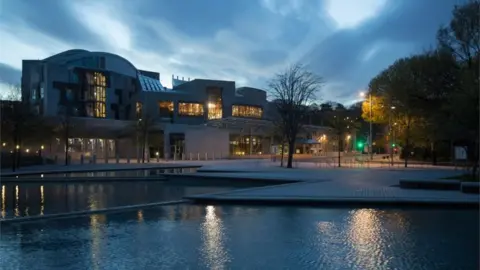Sturgeon seeks 'new spirit of consensus' on Holyrood powers
Nicola Sturgeon has called for a "new spirit of consensus" to defend and enhance Holyrood's powers.
Twenty years on from the devolution referendum, she urged parties to put aside the "sound and fury" of political debate to back the Scottish Parliament.
Ms Sturgeon's government is to publish papers on how new powers in areas such as immigration could be devolved.
And she urged UK ministers to alter the EU Withdrawal Bill, which she said threatens the principle of devolution.
The UK government has insisted that Holyrood's powers will be enhanced, rather than diminished, by the Brexit process.
The Conservatives said the SNP leader was "up to her old constitutional tricks" and "scaremongering" with her remarks.
More than 1.7m Scots backed the creation of a Scottish Parliament on 11 September 1997, with the Yes side triumphing by 74% to 26%.
In a speech in Edinburgh marking the anniversary of the vote, Ms Sturgeon said there was still "passionate disagreement" about "the final destination of our constitutional journey".
However, she said a "new spirit of consensus to match that achieved in 1997" was essential, "with Brexit now threatening the underpinning principle of devolution and many of our vital national interests".
 Scottish government
Scottish governmentThe Scottish government is to publish "a series of evidence-based papers" on extending the parliament's powers, with areas highlighted by the first minister including social security, immigration, employment and trade.
On immigration, Ms Sturgeon said the UK government's goal of reducing the number of people coming into the country could have "devastating consequences" for Scotland. She believes a "Scotland-wide consensus" is possible over giving Holyrood "flexibility" over the policy.
On social security, she said Scottish ministers worked to "mitigate" the consequences of UK policy, but that they should be given the decision-making powers to be more than a "sticking plaster".
 Getty Images
Getty ImagesMSPs will hear a ministerial statement about the UK's Brexit legislation on Tuesday. Scottish ministers are demanding that changes be made before they will recommend that Holyrood gives its legislative consent to the bill.
The first minister said the EU Withdrawal Bill "threatens the very principle on which our parliament is founded", and that Scottish MPs and MSPs could be pivotal in forcing Theresa May's government to change course.
She said: "The devolution settlement - the Scotland Act that established our parliament - is based on the principle that everything is automatically devolved unless it is reserved.
"The Withdrawal Bill turns that principle on its head. As it stands, it will mean that devolved policy areas such as agriculture, fishing and the environment, which are currently carried out at EU level, will be automatically reserved, unless the UK government decides to devolve.
"So on the very day that we should be celebrating devolution, we are being called upon to defend it."
 Getty Images
Getty ImagesThe UK government has insisted that Holyrood "will not lose a single one of its current decision-making powers", with Scotland Office minister Lord Duncan saying the devolved parliament would "gain significant new powers".
Scottish Conservative MP Paul Masterton said Ms Sturgeon's speech was "shameless scaremongering".
He said: "People in Scotland are sick to death of the first minister using Brexit to manufacture more grievance.
"She cannot preach to others about consensus while she refuses to take the threat of another referendum off the table.
"The UK government has made it perfectly clear, on numerous occasions, that the powers of the Scottish Parliament will not be diminished through this process. In fact, the opposite will be the case."
'Hope and optimism'
Scottish Labour said it was "the party of devolution", and said it would not "allow the Tories to use Brexit as a Westminster power grab".
Interim leader Alex Rowley said: "Twenty years on from Scotland voting for a Scottish Parliament with tax raising powers the people of Scotland, quite reasonably in my view, expect our government in Edinburgh to use the powers of our parliament.
"The priority for Nicola Sturgeon and her government must be using the powers to address the big challenges in our NHS, in education, in the economy and in our communities."
Scottish Green co-convener Patrick Harvie said the campaign for more powers "must come with a renewed determination from any governing party to use them", but also hit out at the Brexit legislation.
He said: "The anniversary coincides with a critical moment as the UK prepares to fundamentally undermine the devolution settlement via a power grab repeal bill.
"It remains unclear what the consequences will be if Westminster kills off the principle of legislative consent and unilaterally introduces huge new constraints on the Scottish Parliament."
Scottish Lib Dem leader Willie Rennie said it was "essential" that Ms Sturgeon's government used the "radical powers" which are already available.
He said: "Nicola Sturgeon needs to remember that this is not a Scottish-English battle, it is about the economic and social wellbeing of the whole of our country.
"We will talk to the SNP government about how to handle Brexit in this parliament but we are not interested in driving a wedge between Scotland and England."
